The First Generation of Merrythought

Bringing together the best people and materials, the first Merrythought soft toys started to be produced in the historical Ironbridge factory in late 1930. The product range expanded in the years to follow, and despite the setback of World War 2, the company grew to become a major player in the British toy industry.
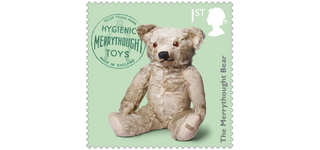
The Merrythought Bear
Although the earliest design to enter Merrythought’s first trials book on 8th October 1930 was simply ‘Elephant’, the original ‘Merrythought Bear’ was created shortly after this, and in 1931, appeared in the inaugural Merrythought catalogue. Florence Attwood created the company’s first collection; an imaginative range of 32 soft toys which included animals, play toys and dolls, alongside the original teddy bear.
In 2017, an authentic replica of the ‘Merrythought Bear’ was recreated using the original patterns held in our company archives. The bear was brought to life in celebration of the Royal Mail’s ‘Classic Toys’ stamp series, and featured upon one of eight unique collectable stamps.
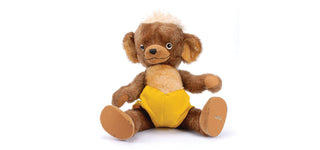
The Original Punkie
Merrythought produced Punkinhead bears exclusively for Eaton’s department store in Canada between the years of 1949 to 1956. Designed by Florence Atwood, this distinctive bear was characterised by a long tuft of hair, bright eyes and a smiley velvet muzzle.
Synonymous with Christmas, Punkinhead was marketed as ‘Santa’s helper’ who longed to be part of the annual Christmas parade, with the department store distributing story booklets of the little bear’s adventure, and featuring him across their Christmas advertising.
Today Punkinhead, known in recent years simply as ‘Punkie’, has an important place amongst Merrythought’s collectable range. New limited edition designs are created each year and enjoyed by collectors around the world, particularly in Japan.
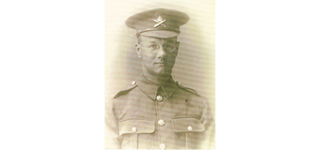
Gordon Holmes
Gordon Holmes, founder of Merrythought, was a true entrepreneur of the British textile industry. He was Director of the established yarn spinning business Holmes, Laxton and Co., and purchased mohair weavers Dyson, Hall and Co., an existing client, in order to secure the supply of high quality teddy bear plush.
He also sought the best team of people to help him build Merrythought into a market leader, bringing in the production expertise of Clifton Rendle, formerly of Chad Valley toy company, and Henry Janisch, who had headed up sales for Britain’s oldest soft toy maker, J. K. Farnell. The ambitious new management team developed a skilled workforce and started driving sales.
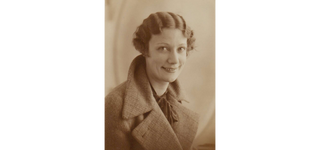
Florence Attwood
Merrythought’s inaugural collection was designed by Florence Attwood, a remarkable pattern maker who overcame many challenges associated with being deaf and unable to speak, to create some of the most iconic designs. This included the original Merrythought and Magnet teddy bears, which still have a strong influence upon the designs created today.
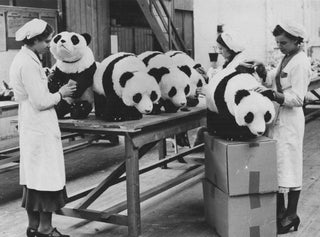
London Zoo Panda
In 1939, Merrythought designed a very special Giant Panda for London Zoo. This life-sized soft toy acted as a stand-in for London Zoo’s own famous Giant Panda, Ming, during various topical films about her species. It was a real first, since before then little was known about these beautiful animals and the only previous panda made by Merrythought had been described as ‘modelled from data supplied by an eminent scientist’.
Merrythought was tasked with designing London Zoo’s version with such lifelike accuracy that people wouldn’t be able to decipher between this and a real Giant Panda; a challenge Gordon and his team readily accepted. The result was that Merrythought had made the very first life-like soft toy panda in the world.
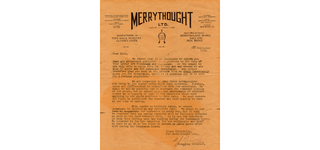
World War II
World War II broke out in 1939 and the British Admiralty took over Merrythought’s Ironbridge factory to carry out vital map-making work, forcing soft toy production there to stop. Merrythought’s reduced workforce moved to nearby premises and used their skills and materials to help the war effort, producing a variety of textile items such as chevrons, helmet linings, igniter bags, gas mask bags and hot water bottle covers.
It wasn’t until 1946 that Merrythought was able to resume production of soft toys in Ironbridge, and this came with many challenges associated with the aftermath of war. If that wasn’t enough, the River Severn also burst its banks and flooded the factory during the same year. Despite a shortage of supplies and components, a small collection of animals and teddy bears was created, as Merrythought endeavoured to bring the joy of their soft toys to customers again.





